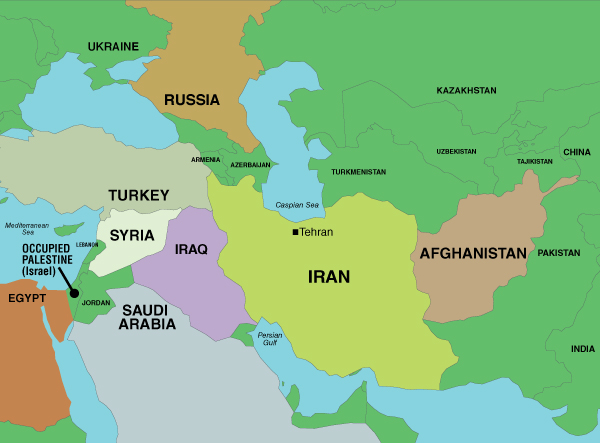July 18, 2015
U.S.‒Iran Nuclear Deal:
Major Move by Reactionary Powers... Nothing Good for Humanity
by Larry Everest | July 20, 2015 | Revolution Newspaper | revcom.us

Obama claims the nuclear deal with Iran is about peace. It’s not. On both sides the deal is being driven by the needs and perceived opportunities for a global oppressive superpower (the US) and a regional oppressive power (Iran). The U.S. sees enlisting Iran as a stabilizing force in a region where the U.S. empire is facing pressing threats (such as ISIS) at a time when they confront increasing challenges from rivals around the world like Russia and China. For the rulers of the Islamic Republic of Iran, this is about gaining recognition by the U.S., stabilizing their regime in the face of domestic discontent, expanding their role as a regional oppressor. There is nothing in this deal on either side, or in the arguments of belligerent opponents of the deal in the U.S. or Iran, that is in the interests of the vast majority of humanity.
On Tuesday, July 14, the U.S. and other world powers finalized a comprehensive nuclear agreement with the Islamic Republic of Iran (IRI).
This is a major event. The agreement was hammered out over many months of often sharply contentious negotiations. The deal’s focus is Iran’s nuclear program, but it also represents a big strategic move—and gamble—by the U.S. and Iran to address the mounting challenges they each face on many fronts in a rapidly changing region and world. (The other world powers that have been part of the negotiations—China, Russia, Germany, France, and Britain—each has its own varying reasons for supporting the agreement.) It is far from certain how this deal will play out, including how other powers and political forces will react to it, but it’s likely to have far-reaching, and possibly unpredictable, ramifications in the Middle East region and globally.
The gist of the agreement is this:
- Iran will reportedly make major cuts and changes to its nuclear program. These include pledging not to enrich uranium over 3.97 percent purity, reducing its current stockpile of low-enriched uranium by 98 percent, cutting its uranium-enriching centrifuges by two-thirds, and restructuring key reactors. Iran is also submitting to continuous monitoring and intrusive inspections of its nuclear sites and possibly other military and research sites for years to come (inspections no U.S. political figure would ever agree to if applied to the U.S. nuclear program!)
- In return the U.S., Germany, Britain, France, Russia, and China have agreed to lift nuclear-related UN, U.S., and European Union economic and financial sanctions on Iran as it complies with these terms. (Obama says sanctions can be “snapped back” into place if the U.S. and its allies decide Iran has violated the agreement.) The U.S. and other world powers have, for the first time, formally accepted Iran’s right to a non-military nuclear enrichment program (for generating energy, producing medicines, etc.) And the agreement gives the IRI a level of recognition from the U.S. of its legitimacy, something the U.S. has refused to do for decades, and opens up the possibility of further dealings with U.S. imperialism and other global players in the future.
Cutting Through Obama’s Deceitful Bullshit
When he announced the deal, President Obama claimed that it would prevent Iran from “obtaining a nuclear weapon,” has “stopped the spread of nuclear weapons in this region,” and greatly lessened the “chance of more war in the Middle East.” He said this was possible “because America negotiated from a position of strength and principle,” and that this showed that “American diplomacy can bring about real and meaningful change—change that makes our country, and the world, safer and more secure.”
First, let’s cut to the chase and through Obama’s deceitful bullshit with some basic truth, then dig deeper:
- This deal is not about ending the danger of nuclear weapons or nuclear conflict, and it won’t do so. Iran has no nuclear weapons. But the U.S. imperialists do—thousands of them—and its close ally Israel has hundreds. Is either of them giving up a single nuke? No. Is either submitting to intrusive inspections? No. In fact, unlike Iran, Israel has refused to sign the Nuclear Non-Proliferation Treaty (NPT) or submit to any international inspection or control. Both the U.S. and Israel have repeatedly declared their right to use military force anywhere they see fit. In fact, after the agreement was announced, Obama made a point of threatening military force against Iran in the event the U.S. decides it hasn’t abided by the deal.
- This deal may have headed off a U.S.-Iran military confrontation, at least for now, but the U.S. is still waging or supporting wars—including in Syria, Iraq, Yemen, Afghanistan, Palestine, and Somalia—and other forms of violence responsible for death and suffering on an enormous scale in the Middle East and Central Asia. And the U.S. is planning to step up military support for Israel and Saudi Arabia—both reactionary, war-mongering regimes—in the wake of the nuclear deal.
- Most important, this agreement does not show that “American diplomacy can bring about real and meaningful change” or that it can make the masses of people “safer and more secure.” There is nothing good for humanity anywhere in this deal. It’s a deal between reactionary imperialist and global powers on one side, and a regional reactionary power on the other. All are attempting to maintain the current political-economic order that faces all kinds of challenges, an order at the root of the catastrophic misery, violence, and wars that today engulf millions from North Africa through the Middle East to Central Asia: global capitalism, as well as reactionary Islamic fundamentalism as embodied in Iran’s Islamist theocracy.
- Obama brags that this deal happened because the U.S. was negotiating “from a position of strength and principle.” The “strength” Obama refers to is U.S. imperialism’s global economic and military dominance, which enabled it and other reactionary big powers to strangle Iran’s economy with sanctions and repeatedly threaten it with attack. The “principle” involved is nothing more than “might makes right.” The economic sanctions by the U.S., UN, and European Union against Iran were never simply aimed at halting Iran’s nuclear program; they were intended to create suffering and discontent among the Iranian people in order to weaken the Iranian regime and to set terms for the negotiations, which factions in the Iranian ruling class have also been pursuing to further their own interests. These sanctions crippled Iran’s economy, triggering massive unemployment and cutting off vitally needed imports, including foods and medicines. Many millions of Iranians have been severely harmed; untold hundreds, perhaps thousands, have died. Targeting a civilian population constitutes collective punishment and is a crime against humanity. This is what imperialist “diplomacy” looks like.
- The U.S. was also negotiating because it faces profound new challenges—weaknesses—including more assertive global rivals, deep divisions within the U.S. establishment, a Middle East in turmoil, and the failure of its decades-long efforts to isolate and overthrow the IRI. And the U.S. so-called “war on terror” (really a war for empire) to violently reshape the whole region has generated all kinds of new problems for U.S. imperialism. Although a much smaller, weaker regional power, the IRI came to the table with its own set of “cards” (its relative internal coherence, regional strengths, and global ties), as well as serious challenges, including a sanctions-crippled economy, covert campaigns and military threats from the U.S., Israel, and Saudi Arabia, and deep internal disaffection with its oppressive, theocratic rule.
What Are Both Sides Trying to Do Here?
This nuclear deal is significant for the U.S. in its own right. No one argues Iran has any nuclear weapons. The U.S. and its allies claim that Iran has been pursuing nuclear weapons, but this has never been shown conclusively. What is certain is that Iran’s defiance of U.S. demands that it halt its enrichment program, and the possibility Iran could develop the ability to actually build a nuclear weapon, are deeply threatening to the U.S.-dominated regional order, including militarily. So this agreement greatly constrains Iran’s ability to further develop its nuclear program, let alone build a bomb (if it ever sought to do so) through drastic cutbacks to Iran’s programs for at least 10 years and a 25-plus-year inspection regime among the most intrusive ever devised.
But more importantly, the Obama team sees this nuclear deal as the beginning of an effort to bring Iran into “the community of nations,” as Obama put it, in other words, more integrated into the U.S.-dominated global and regional orders. If this works out, and that’s a big if, Iran could go from one of U.S. imperialism’s biggest long-term problems to a globally important country more helping than harming the U.S. agenda.
After decades of demonization and diplomatic and political isolation, Iran is effectively being recognized as a legitimate state to deal with, its basic right to enrich uranium recognized, and with the lifting of sanctions it stands to gain access to some $100 billion-plus of its own frozen assets and greater access to global economic and financial markets. Because of this, the Iranians are declaring the deal a victory and validation of their position.
But the agreement also gives the U.S. and its allies important leverage in its attempt to pull Iran into its orbit. One, it sets up an apparatus for gaining intelligence on Iran’s infrastructure and military capabilities which itself is a potential club over Iran’s head (because it could give the U.S. important military advantages in the event of war). The intrusive, and humiliating, inspections may undermine the regime’s legitimizing credentials as a bastion of resistance to U.S. imperialism.
Foreign Policy reports, “Obama’s vision was that an agreement would curtail Tehran’s power by not only taking away its nuclear option, but also by undermining its credentials as the leader of the anti-Western camp. By diffusing the enmity with Tehran, the United States could also alter its military posture in the Persian Gulf, which has been partially driven by the threat from Tehran since 1979.” (July 15, 2015)
Obama’s overarching objectives are: to pull Iran into the U.S. orbit, and prevent rivals China or Russia from making further inroads (China has been one of the leading investors in Iran’s energy sector); to enlist Iran as a stabilizing regional force, at a moment when fragmentation is one of the U.S.’s greatest regional concerns; to rely on regional powers, rather than deployments of U.S. ground troops, to defeat its most pressing threats (such as ISIS); and most importantly, to be able to give the U.S. greater flexibility to meet even greater challenges globally. (For instance, Gen. Joseph F. Dunford Jr., Obama’s nominee to be the next Chairman of the Joint Chiefs of Staff, testified in Congress recently that Russia’s “aggressive behavior and its nuclear arsenal make it the greatest national security threat faced by the United States.” New York Times, July 9, 2015)
“This achievement is not final. It is fragile, as forces against it are formidable.”
All this is much easier said than done and how this agreement works out is far from certain. The imperialist policy group, International Crisis Group, writes that the “achievement” of the nuclear deal “is not final. It is fragile, as forces against it are formidable.” (July 14, 2015)
For one, opponents of the agreement—in the U.S., Israel, and Saudi Arabia—argue that the legitimacy and resources the Islamic Republic stands to gain from the accord could make it an even greater challenge to the traditional regional order. In doing so, these opponents acknowledge the unspoken reality that just restricting Iran’s nuclear program has never been the central issue—U.S. regional hegemony and the stability of key allies like Israel and Saudi Arabia, for which Iran does pose a serious challenge, have been. They warn that any attempts to reform the regional order, or embolden Iran, at a moment of immense upheaval could prove catastrophic.
Obama counters that simply trying to maintain the regional status quo of unlimited U.S. backing for the traditional pillars of U.S. dominance—Israel, Saudi Arabia, and Egypt—and unending hostility toward Iran (with the possibility of war looming), is no longer tenable, given the failure of massive U.S. interventions to stabilize Iraq or Afghanistan, ongoing regional upheavals, the growing strength of ISIS and other Sunni jihadists, and most importantly the U.S. need to deal with global rivals, in particular Russia and China. Meanwhile, Iran has proven a relatively stable, coherent regime (and Obama has spoken openly of his concerns about the long-term stability of countries like Saudi Arabia and Egypt) with which the U.S. shares common interests in the region including crushing ISIS and Sunni jihadism, stabilizing Iraq, and resolving the civil war in Syria.
At the same time, the whole situation that led up to this deal is very unstable and there are and will be intense pulls and stresses that could undo the agreement. The IRI has its own necessities and ambitions, and the lifting of sanctions may well give it more room to stabilize its rule, maneuver internationally, and exert influence in the region. (Russia is already talking of being able to resume deals with Iran for nuclear technology and military equipment.)
There are dangers in the deal for the IRI as well. The Islamic Republic is a reactionary theocracy that came to power claiming that it was anti-U.S. and anti-imperialist, and that Islam offered a “third way” that was neither capitalist nor communist. These claims were demagogic rhetoric. Iran’s Islamist revolution has proved incapable of breaking with the world capitalist system—including Iran’s dependence on oil production and sales. Their Islamic revolution’s program and vision never went beyond taking over an imperialist-dominated, semi-feudal Iran and renegotiating terms with the U.S. and other powers, and imposing a religious form of rule and social norms. This dictated, among other things, a restructuring of political/cultural relations with the West, as well as regional policies which clashed with U.S. objectives. Now that the IRI’s willingness to deal and collaborate with the U.S. imperialists they had once labeled the “Great Satan” is in the open and on a whole new level, there are real divisions within Iran’s ruling establishment over the nuclear deal’s implications for Iran’s standing and for Islamic rule. Some fear it will undermine the cohering norms and legitimacy of the regime. Others, including Iran’s President Rouhani, feel the only way the Islamic Republic can survive is to break its diplomatic and economic isolation, including in relation to the U.S.
Meanwhile, the Obama administration is attempting to both keep its allies in line and keep pressure on Iran by stepping up military support for Israel and Saudi Arabia and threatening to punish Iran for sponsoring “terrorism” in the region (i.e., supporting forces like Hezbollah in Lebanon that the U.S. and Israel are in conflict with). Meanwhile, there are reports that the Israelis and their U.S. supporters will wage an all-out campaign against the deal in the U.S., and reports that the Saudis are reacting by stepping up their regional campaign, often waged through proxies (which include some Sunni jihadist forces which could ultimately turn on the Saudis), against Iran. This is another example of how all the “answers” the oppressive powers are adopting to the difficulties they face in turn create new misery and horrors for the people, and unleash new contradictions for themselves as well.
In the U.S., Republicans have condemned the deal with all kinds of extreme belligerent rhetoric, and promise congressional hearings and possibly attempts to vote down the accord. The virulence of these objections by ruling class forces reflects disagreements over foreign policy, but also interpenetrates with longstanding and fundamental conflicts among the rulers over a whole range of issues. (For an incisive analysis of the conflicts within the U.S. ruling class in this period and how to act on that stage to work for a real liberating revolution, see Bob Avakian, The Coming Civil War and Repolarization for Revolution in the Present Era.)
The ongoing tensions between the U.S. and Iran, between the U.S. and the other global powers involved in the negotiations, the continuing turmoil in the region, and the actions by opponents of the nuclear deal, make it highly risky for both sides—and this is reflected in the real strains within each ruling class. These strains in turn increase the potential for destabilization and overall point to the reality that this deal is not going to signal long-term stabilization of the Middle East or the world.
All this underscores the fact that those who preside over this world of horrors—in the U.S., Iran, and other capitals, are not all powerful. They face intractable contradictions and have no fundamental solutions to the horrors they’ve created. Communist revolution is the only way out of this madness, and it is urgent to make revolution at the soonest possible moment and to fight for revolution everywhere by spreading Bob Avakian’s new synthesis of communism, encapsulated in Communism: The Beginning of a New Stage—A Manifesto from the Revolutionary Communist Party, USA (available in seven languages), and at revcom.us worldwide to bring forward another liberating pole for humanity. There are vanguard communist parties in both the U.S. and Iran working for real revolution: the Revolutionary Communist Party, USA and the Communist Party of Iran (Marxist-Leninist-Maoist).
Making revolution is a serious and difficult challenge, but it is possible and the only REAL way to break out of the “alternatives” presented by the rulers of the U.S. or the Islamic Republic of Iran.
Volunteers Needed... for revcom.us and Revolution
If you like this article, subscribe, donate to and sustain Revolution newspaper.










